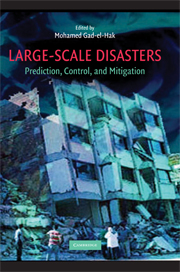Book contents
- Frontmatter
- Contents
- Preface
- About the editor
- List of contributors
- 1 Introduction
- 2 The art and science of large-scale disasters
- 3 Multiscale modeling for large-scale disaster applications
- 4 Addressing the root causes of large-scale disasters
- 5 Issues in disaster relief logistics
- 6 Large-scale disasters: perspectives on medical response
- 7 Augmentation of health care capacity in large-scale disasters
- 8 Energy, climate change, and how to avoid a manmade disaster
- 9 Seawater agriculture for energy, warming, food, land, and water
- 10 Natural and anthropogenic aerosol-related hazards affecting megacities
- 11 Tsunamis: manifestation and aftermath
- 12 Intermediate-scale dynamics of the upper troposphere and stratosphere
- 13 Coupled weather–chemistry modeling
- 14 Seasonal-to-decadal prediction using climate models: successes and challenges
- 15 Climate change and related disasters
- 16 Impact of climate change on precipitation
- 17 Weather-related disasters in arid lands
- 18 The first hundred years of numerical weather prediction
- 19 Fundamental issues in numerical weather prediction
- 20 Space measurements for disaster response: the International Charter
- 21 Weather satellite measurements: their use for prediction
- Epilogue
- Index
8 - Energy, climate change, and how to avoid a manmade disaster
Published online by Cambridge University Press: 20 October 2009
- Frontmatter
- Contents
- Preface
- About the editor
- List of contributors
- 1 Introduction
- 2 The art and science of large-scale disasters
- 3 Multiscale modeling for large-scale disaster applications
- 4 Addressing the root causes of large-scale disasters
- 5 Issues in disaster relief logistics
- 6 Large-scale disasters: perspectives on medical response
- 7 Augmentation of health care capacity in large-scale disasters
- 8 Energy, climate change, and how to avoid a manmade disaster
- 9 Seawater agriculture for energy, warming, food, land, and water
- 10 Natural and anthropogenic aerosol-related hazards affecting megacities
- 11 Tsunamis: manifestation and aftermath
- 12 Intermediate-scale dynamics of the upper troposphere and stratosphere
- 13 Coupled weather–chemistry modeling
- 14 Seasonal-to-decadal prediction using climate models: successes and challenges
- 15 Climate change and related disasters
- 16 Impact of climate change on precipitation
- 17 Weather-related disasters in arid lands
- 18 The first hundred years of numerical weather prediction
- 19 Fundamental issues in numerical weather prediction
- 20 Space measurements for disaster response: the International Charter
- 21 Weather satellite measurements: their use for prediction
- Epilogue
- Index
Summary
Energy powers our life, and energy consumption correlates well with our standards of living. The developed world has become accustomed to cheap and plentiful supplies. Recently, more of the developing world populations are striving for the same, as well as taking steps toward securing their future needs. Competition over limited supplies of conventional resources is intensifying, and more challenging environmental problems are springing up, especially related to carbon dioxide (CO2) emissions. Strong correlations have been demonstrated between CO2 concentration in the atmosphere and the average global temperature, and predictions indicate that the observed trends over the past century will continue. Given the potential danger of such a scenario, steps should be taken to curb energy-related CO2 emissions, enabled technologically and applied in a timely fashion. These include substantial improvements in energy conversion and utilization efficiencies, carbon capture and sequestration, and expanding the use of nuclear energy and renewable sources.
Introduction
Energy has been regarded as the most challenging need for humanity, and has been ranked highest on the list of priorities and requisites for human welfare. Through rapid industrialization and the implementation of modern economic systems, food production has expanded, at the expense of using more energy in agriculture and food transportation and processing.
- Type
- Chapter
- Information
- Large-Scale DisastersPrediction, Control, and Mitigation, pp. 177 - 211Publisher: Cambridge University PressPrint publication year: 2008



